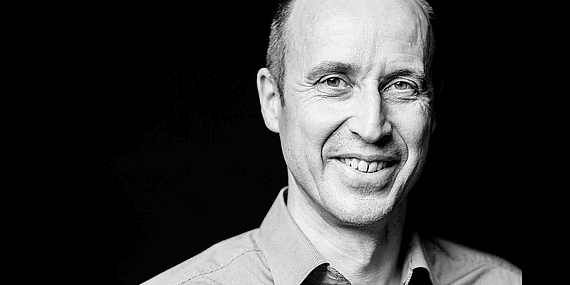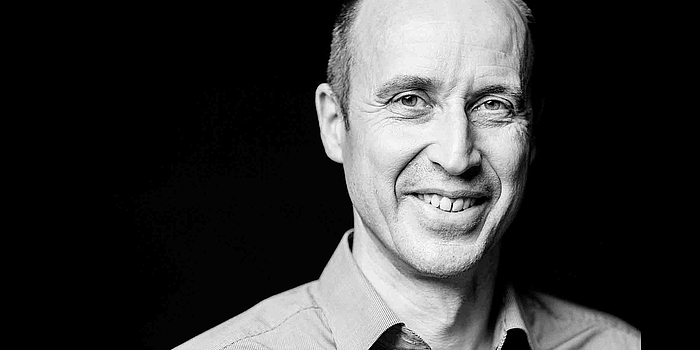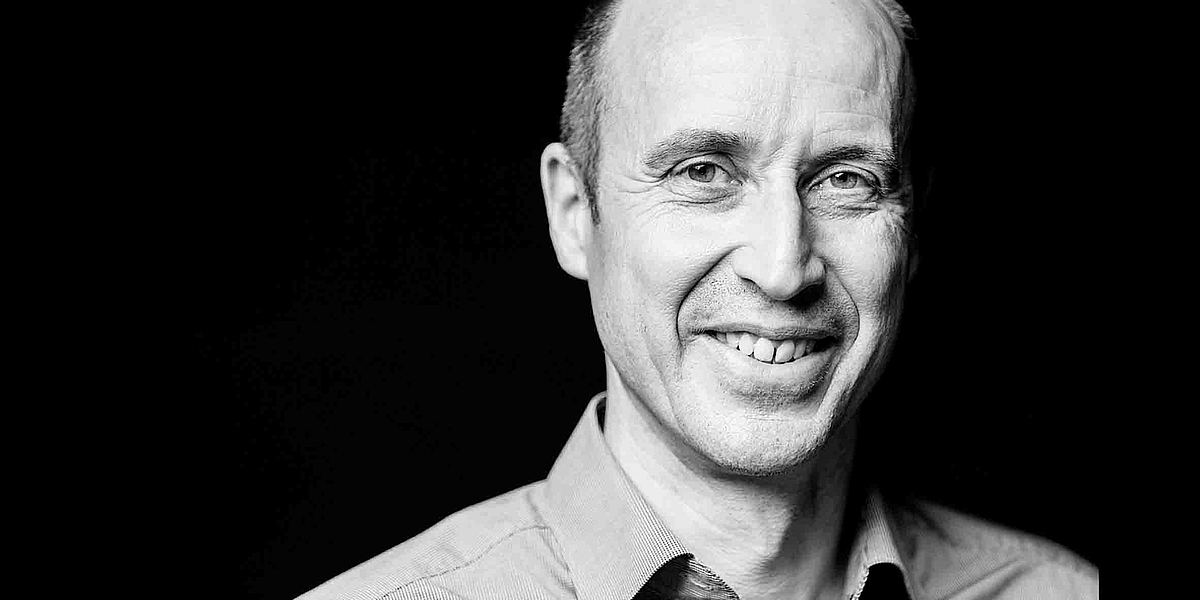

 ©
Julian Martitz
©
Julian Martitz
Christian Werthmann ist Professor für Landschaftsarchitektur und Entwerfen an der Leibniz Universität Hannover. Als praktizierender Landschaftsarchitekt hat Werthmann große Bauprojekte in weltbekannten Designbüros in Deutschland und den USA realisiert. Als Akademiker hat er zahlreiche Bücher und Artikel geschrieben, die weltweit ausgestellt wurden, und war Vortragender auf internationalen Konferenzen zum Thema Landschaft und Urbanismus.
-
Biographie
Christian Werthmann ist Professor für Landschaftsarchitektur und Entwerfen an der Leibniz Universität Hannover.
Als praktizierender Landschaftsarchitekt hat Werthmann große Bauprojekte in weltbekannten Designbüros in Deutschland und den USA realisiert. Als Wissenschaftler hat er zahlreiche Bücher und Artikel geschrieben, weltweit ausgestellt und auf internationalen Konferenzen über Landschaft und Urbanismus gesprochen. Er ist auch als Kurator und Co-Kurator von interdisziplinären Symposien tätig. Seine Forschung konzentriert sich auf die Möglichkeiten der Landschaftsarchitektur in stark urbanisiertem, sozial konfliktreichem und risikoreichem Terrain. Mit seiner Arbeit gehört er zu einer kleinen, aber wachsenden Gruppe von Landschaftsarchitekten, die sich in informellen Städten und Katastrophengebieten engagieren, wo er technische Innovationen mit sozialen und natürlichen Systemen überlagert, um produktive und ansprechende öffentliche Räume zu schaffen.
Bis 2012 war Werthmann außerordentlicher Professor und ehemaliger Direktor des Master-Studiengangs für Landschaftsarchitektur an der Harvard Graduate School of Design. Ein Teil seiner dortigen Forschungsarbeit mündete in dem Buch "Green Roof: A Case Study" (Princeton Architectural Press, 2007), das inzwischen zu einem festen Bestandteil der Lehrpläne nordamerikanischer Designschulen geworden ist. Seit 2007 konzentriert sich Werthmann auf das Phänomen des informellen Urbanismus als dominierende Kraft des urbanen Wachstums auf dem Planeten. Im Frühjahr 2008 veranstaltete er zusammen mit dem Landschaftstheoretiker John Beardsley eine Wanderausstellung mit dem Titel "Dirty Work: Transforming the Landscape of Nonformal Cities in the Americas", in der landschaftsbasierte Projekte im informellen Sektor von sieben lateinamerikanischen Städten vorgestellt wurden. Außerdem gab er den Studioreport "Tactical Operations in the Informal City" (2009) heraus, der von der American Society of Landscape Architects mit dem 2010 Award in Communication Excellence ausgezeichnet wurde und als eine der ersten akademischen Ressourcen gilt, die landschaftsbasierte Visionen für informelle Städte vorstellen.
Aufgrund seiner innovativen, risikobezogenen Forschungsuntersuchungen wurde Werthmann mit dem renommierten Hans-Fischer-Senior-Stipendium der Technischen Universität München ausgezeichnet (2011), wo er zwei große Konferenzen zur informellen Urbanisierung kuratierte (Metropolis Nonformal, 2011 und 2013). Basierend auf diesen Konferenzen veröffentlichte er zusammen mit der Journalistin Jessica Bridger ein Buch über die strategischen Ansätze von 25 Experten zur informellen Urbanisierung (Metropolis Nonformal, 2015).
Seit 2011 liegt sein Schwerpunkt auf landschaftsbasierten Resilienzstrategien für einkommensschwache Gemeinden, die von Naturkatastrophen bedroht sind. Die darauf folgenden Arbeiten umfassten Studien für Gemeinden nach dem Erdbeben in Haiti (gemeinsam mit MIT und Harvard), Strategien für die informelle Urbanisierung in den erdrutschgefährdeten Hügeln von Medellin, Kolumbien (Rehabitar la ladera, 2014, Inform@risk, 2022) und Studien zu Überschwemmungsproblemen in São Paulo (2015). Im Jahr 2017 kuratierte er die Konferenz Dangerous Landscapes im Schloss Herrenhausen in Hannover. Basierend auf dieser Arbeit ko-kuratierte er die Ausstellung "out there. Landschaftsarchitektur auf globalem Terrain" im Architekturmuseum der Technischen Universität München (2017), die anschließend im Museum Schloss Herrenhausen in Hannover gezeigt wurde (2018).
Seine neueste Monografie "Informal Urbanization in Latin America. Collaborative Transformations of Public Spaces" (2021) erforscht landschaftsarchitektonische Interventionen in der informellen Urbanisierung über lange Zeiträume.
- Vita
-
Publikationsliste
BÜCHER
Andres Lepik in cooperation with Undine Giseke, Regine Keller, Jörg Rekittke, Antje Stokman, Christian Werthmann (eds.) Out There. Landscape Architecture on Global Terrain. Berlin: Hatje Cantz, 2017
Werthmann, Christian, and Jessica Bridger, eds. Metropolis Nonformal. San Francisco: Applied Research + Design Publishing, 2015.
Werthmann, Christian. Green Roof- A Case Study: Michael Van Valkenburgh’s Associates
Design for the Headquarters of the American Society of Landscape Architects. New York: Princeton Architectural Press, 2007.FORSCHUNGSBERICHTE
Werthmann, Christian, and Alejandro Echeverri, eds. Rehabitar La Montaña: Estrategias y procesos para un hábitat sostenible en las laderas de Medellín. Medellin: Universidad EAFIT, 2013.
Werthmann, Christian, Alejandro Echeverri, and Ana Elvira Vélez, eds. Rehabitar La Ladera: Shifting Ground. (Medellin: Universidad EAFIT, 2012), accessed April 10, 2015, http://issuu.com/werthmann/docs/shiftingground.
Werthmann Christian, Phil Thompson, Dan Weissman, Anya Brickman Raredon, and Erdem Ergin, eds. Designing Process: Opportunities for Long- term Sustainable Urbanization in Post-Disaster Port-au-Prince, Haiti. (USA: Harvard MIT, 2012), accessed April 10, 2015, http://issuu.com/gsdmit/docs/designingprocess/1.
Schröpfer, Thomas, Christian Werthmann, and Limin Hee. TransUrban: Charting Experiments for Cities of the Future. Case Study 03: Valdesparterra, Spain; Case Study 04: Sarriguren, Spain; Case Study 05: BO2, Malmö, Sweden. Cambridge, MA: Harvard University, Graduate School of Design, 2010.
Schröpfer, Thomas, Christian Werthmann, and Limin Hee. TransUrban: Charting Experiments for Cities of the Future. Case Study 02: solarCity Linz- Pichling. Cambridge, MA: Harvard University, Graduate School of Design, 2008.
ARTIKEL
Schröpfer, Thomas, Christian Werthmann, and Limin Hee. TransUrban: Charting Experiments for Cities of the Future. Case Study 01: Vauban. Cambridge, MA: Harvard University, Graduate School of Design, 2007.
Werthmann, Christian. “Der Raum im Zeitalter seiner technischen Reproduktion. Über Materialität und Virtualität (Eng.: Space in the Time of its Technical Reproduction. About Materiality and Virtuality).” Thesis, Fachhochschule Weihenstephan, 1992.
Werthmann, Christian "Zur Ausstellung Draußen. Landschaftsarchitektur auf globalem Terrain" MAP- München Architektur Programm 03+04 2017. München: Fakultät für Architektur und dem Architekturmuseum der Technischen Universität München, 2017
Claghorn, Joseph, Orsini, Francesco Maria, Echeverri Restrepo, Carlos Alejandro, Werthmann, Christian. „Rehabitar la Montaña: strategies and processes for sustainable communities in the mountainous periphery of Medellín“ urbe 8 (1), 2016.
Claghorn, Joseph, Christian Werthmann. „Shifting Ground: Landslide Risk Mitigation through Community-Based Landscape Interventions.“ Journal of Landscape Architecture 10 (2015): 6-15.
Claghorn, Joseph, Christian Werthmann. “Non-formal Growth and Landslide Risk. Strategies to improve non-formal settlements in Medellin.“ TOPOS 90 (2015): 50-56
Werthmann, Christian. “Landschaftsarchitektur in einer geteilten Welt.“ In Zukunft Stadtgrün: Nutzen und Notwendigkeit urbaner Freiräume, edited by DGGL e.V., 102-106. München: Callwey, 2014.
Werthmann, Christian. “Social Design – Die Rolle der Landschaftsarchitektur in der Urbanisierung unseres Planeten.” Unimagazin, Zeitschrift der Leibniz Universität Hannover 03/04 (2013): 50-55.
Werthmann, Christian. “Designing Process: The Exemplar Community Zoranje in Haiti.“ TOPOS 76 (2011): 90-96.
Werthmann, Christian. “Landscape on the Edge.“ In Urban Agriculture Casablanca: Design as an integrative Factor of Research, edited by Undine Giseke, 6-7. Berlin: Technische Universität Berlin, 2010.
Werthmann, Christian, Limin Hee and Thomas Schröpfer. “Aspirations and Realities of Exemplary Eco-cities.“ Detail Green 2 (2010): 12-15.
Werthmann, Christian. “Green Infrastructure in Slums.“ Paper presented at CELA Conference, the Netherlands, Maastricht, May 12-14, 2010.
Werthmann, Christian, “Green Roofs in Dry Climates.“ Paper presented at Proceedings of Water Expo Zaragoza, Spain, June 12-14, 2008.
Werthmann, Christian. “Tactical Infrastructure Interventions.“ In SLUM Lab: Informal Toolbox, edited by Alfredo Brillembourg, and Hubert Klumpner, 68- 71. São Paulo: São Paulo Housing Agency, 2008.
Werthmann, Christian, and John Beardsley. “Dirty Work.“ TOPOS 64 (2008): 36-42.
Werthmann, Christian, and John Beardsley. “Improving Informal Settlements.“ Harvard Design Magazine 28 (2008): 31-34.
Werthmann, Christian. “Making History: The Favela Bairro Program and More.“ Harvard Design Magazine 28 (2008): 46-49.
Werthmann, Christian. “Dirty Water: The Guarapiranga Reservoir, Parque Amelia: The City of Sao Paulo; Watery Voids: MMBB.“ Harvard Design Magazine 28 (2008): 58-61.
Werthmann, Christian, and Thomas Schroepfer. “Faculty Project TransUrban.“ Harvard Design Magazine 28 (2008): 126-127.
Werthmann, Christian, Thomas Schroepfer, and Limin Hee. “TransUrban: Vauban.” Paper presented at 3rd International Conference on Sustainable Development and Planning, Algarve, Portugal, April 25-27, 2007.
Werthmann, Christian. “Mesopotamian Marshes and Modern Development: Practical Approaches for Sustaining Restored Ecological and Cultural Landscapes Harvard University, October 28–30, 2004.“ Landscape Journal 24 (2005): 223-224.
Werthmann, Christian. “Power Fusion: Landschaftsurbanismus und grüne Infrastruktur in den USA.“ Garten+Landschaft 4 (2007): 16-19.
BUCHBEITRÄGE
Werthmann, Christian "Learning from Canaan, Haiti’s Third Largest
City (?) Born in the Aftermath of a Catastrophe" in Bandau, Anja , Brüske, Anne und Ueckmann, Natascha (Hrsg.): Reshaping Glocal Dynamics of the Caribbean: Relaciones y Desconexiones, Relations et Déconnexions, Relations and Disconnections, Heidelberg: Heidelberg University Publishing, 2018, p. 231-242Werthmann, Christian. "Walking the Third Path" In: Inspiration Highline, edited by Udo Weilacher, 64-65. Munich: Technical University Munich, 2018.
Werthmann, Christian. "Warum der Garten im Zeitalter planetarischer Urbanisierung noch nicht ausgedient hat" In: Wolschke-Bulmahn, Joachim/Clark, Ronald (eds.): Der Garten als Modell. Festschrift für Kaspar Klaffke, Herrenhäuser Schriften. Eine Reihe der Freunde der Herrenhäuser Gärten e.V., Band 5, 383-394. Munich: Akademische Verlagsgemeinschaft München, 2017.
Undine Giseke, Regine Keller, Jörg Rekittke, Antje Stokman, Christian Werthmann "Out There. Landscape Architecture on Global Terrain" In: Out There. Landscape Architecture on Global Terrain, edited by Andres Lepik in cooperation with Undine Giseke, Regine Keller, Jörg Rekittke, Antje Stokman, Christian Werthmann, 8-11. Berlin: Hatje Cantz, 2017.
Werthmann, Christian. "São Paulo, Brasil. The Lost River of Tamanduateí". In: Out There. Landscape Architecture on Global Terrain, edited by Andres Lepik in cooperation with Undine Giseke, Regine Keller, Jörg Rekittke, Antje Stokman, Christian Werthmann, 136-145. Berlin: Hatje Cantz, 2017.
Werthmann, Christian. "Medellín, Colombia. Shifting Ground" In: Out There. Landscape Architecture on Global Terrain, edited by Andres Lepik in cooperation with Undine Giseke, Regine Keller, Jörg Rekittke, Antje Stokman, Christian Werthmann, 124-133. Berlin: Hatje Cantz, 2017.
Werthmann, Christian. "Daseinsvorsorge für die andere Mehrheit: Eine internationale Perspektive" In: Stadt Denken 1, edited by Deutsche Akademie für Städtebau und Landesplanung, 129-140, Berlin, 2017.
Werthmann, Christian. „Skipping Centralization“ In: Global Stability Through Decentralization?, edited by Martin A. Wilderer and Martin Grambow, 75-80. Heidelberg: Springer, 2016
Hannemann, Johann-Christian, Christian Werthmann, and Thomas E. Hauck. “Designing for Uncertainty: The Case of Canaan, Haiti.“ In Revising Green Infrastructure: Concepts between Nature and Design, edited by Daniel Czechowski, Thomas Hauck, and Georg Hausladen, 323-351. Boca Raton: CRC Press, 2014.
Werthmann, Christian. “Pollution and Propaganda.“ In Design in the Terrain of Water, edited by Anuradha Mathur, and Dilip da Cunha, 123-129. Philadelphia: Applied Research + Design Publishing, 2014.
Werthmann, Christian. “Biotic Rooftops.“ In Ecological Architecture, edited by Thomas Schröpfer, 70-78. Basel: Birkhäuser, 2012.
Werthmann, Christian. “Is Informal Urbanism Sustainable.“ In Sustainable Urbanism and Beyond, edited by Tigran Hassan, 58-60. New York: Rizzoli, 2012.
Werthmann, Christian. “Dirty Work: Landscape and Infrastructure in Nonformal Cities.“ In Design with the Other 90%: Cities, edited by Cynthia E. Smith, 78-93. New York: Cooper Hewitt, Smithsonian Design Museum, 2011.
Werthmann, Christian. “Squatting Infrastructure.“ In Infrastructural Urbanism, edited by Thomas Hauck, Regine Keller, and Volker Kleinekort, 289-302. Berlin: Dom Publishers, 2011.
Werthmann, Christian. “Stalker.“ In Learning from Duisburg Nord: Kommentare internationaler Experten zu einem Meisterstück aktueller Landschaftsarchitektur, edited by Udo Weilacher, 76-77. München: Lehrstuhl fuer Landschaftsarchitektur und industrielle Landschaft, Technical University Munich, 2010.
Werthmann, Christian. “A Place in Heaven, a Place in Hell: Tactical Operations in São Paulo.“ In Ecological Urbanism, edited by Mohsen Mostafavi, and Gareth Doherty, 588-589. Baden, Switzerland: Lars Müller Publishers, 2010.
Werthmann, Christian. “Story of a Map.“ In A View on Harvard GSD Vol. 1, edited by Mohsen Mostafavi, Alexander Dean, and Victoria Wiley, 653. Cambridge, MA: Tank Form Ltd for the Harvard University Graduate School of Design, 2009.
Werthmann, Christian. “Environmental and Informal Urbanism – a Comparison.“ In Metropolis 2: Resources: Design for the Future of Metropolis, edited by Oliver Hamm, and Olaf Bartels, 122-133. Berlin: Jovis, 2008.
STUDIO-BERICHTE
Werthmann, Christian, ed. Tactical Operations in the Informal City. São Paulo: São Paulo Housing Agency, 2009.
Werthmann, Christian, and Carl Steinitz, eds. Reviving the Tajo River. Toledo: Fundación + Summa, 2008.
Werthmann, Christian, and Carl Steinitz, eds. An Alternative Future for the Landscapes of Castilla: La Mancha. Toledo : Foro Civitas Noca; Cambridge, MA: Harvard University, Graduate School of Design, 2007.


